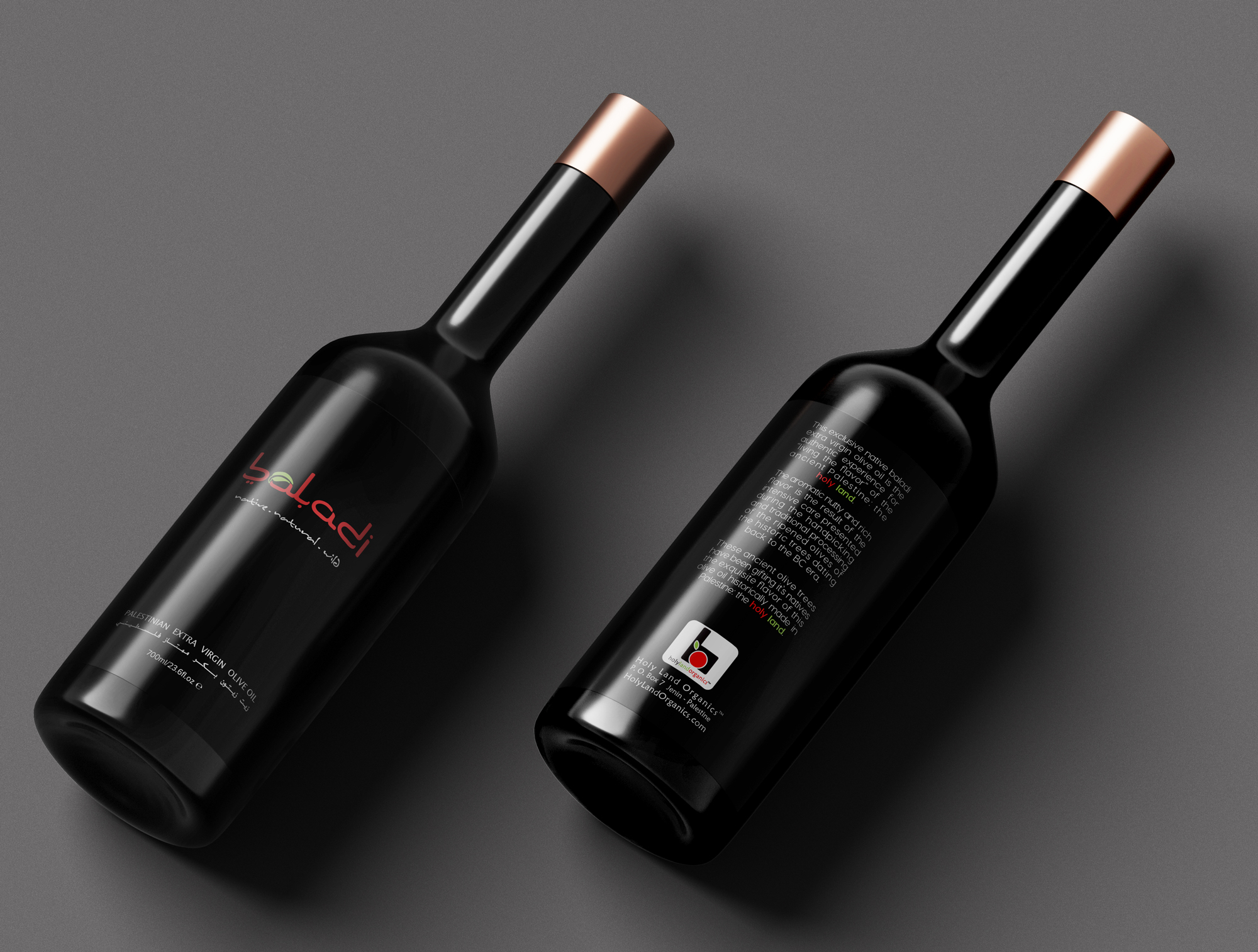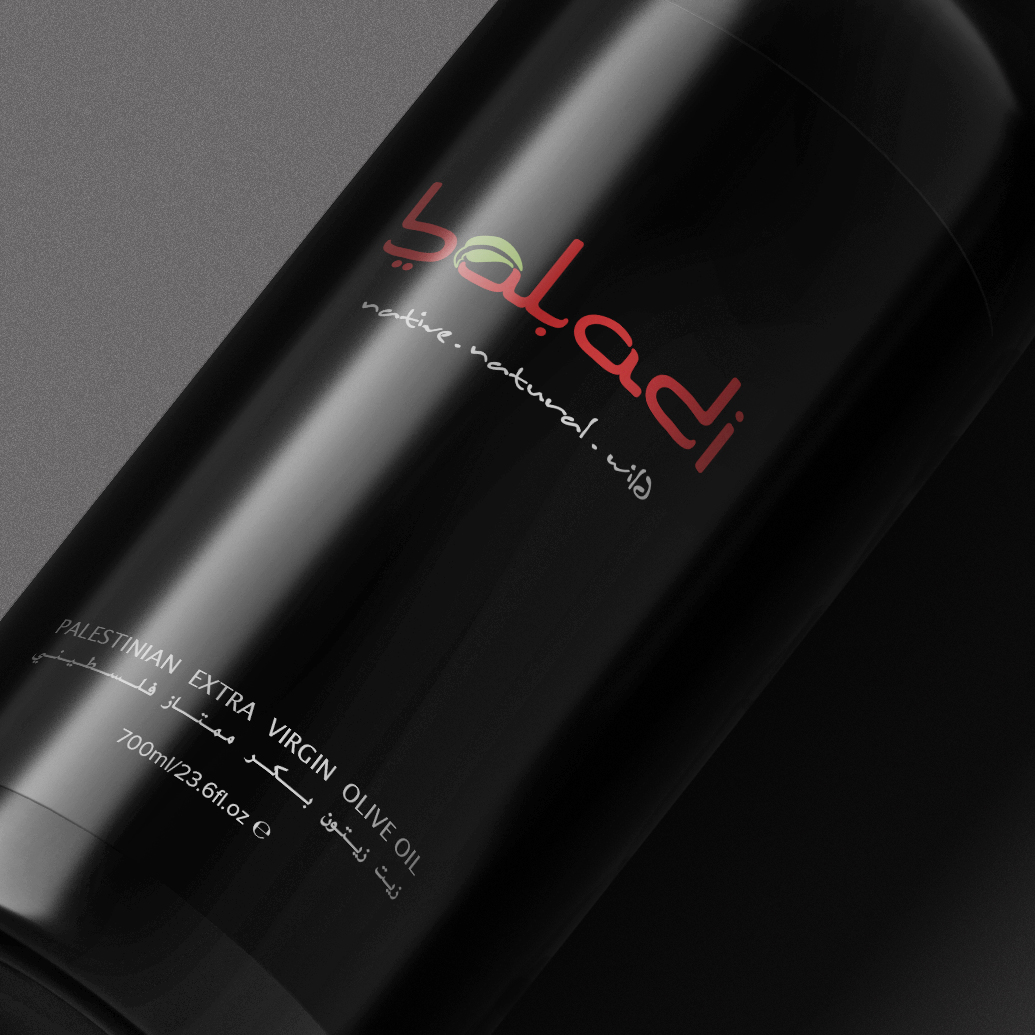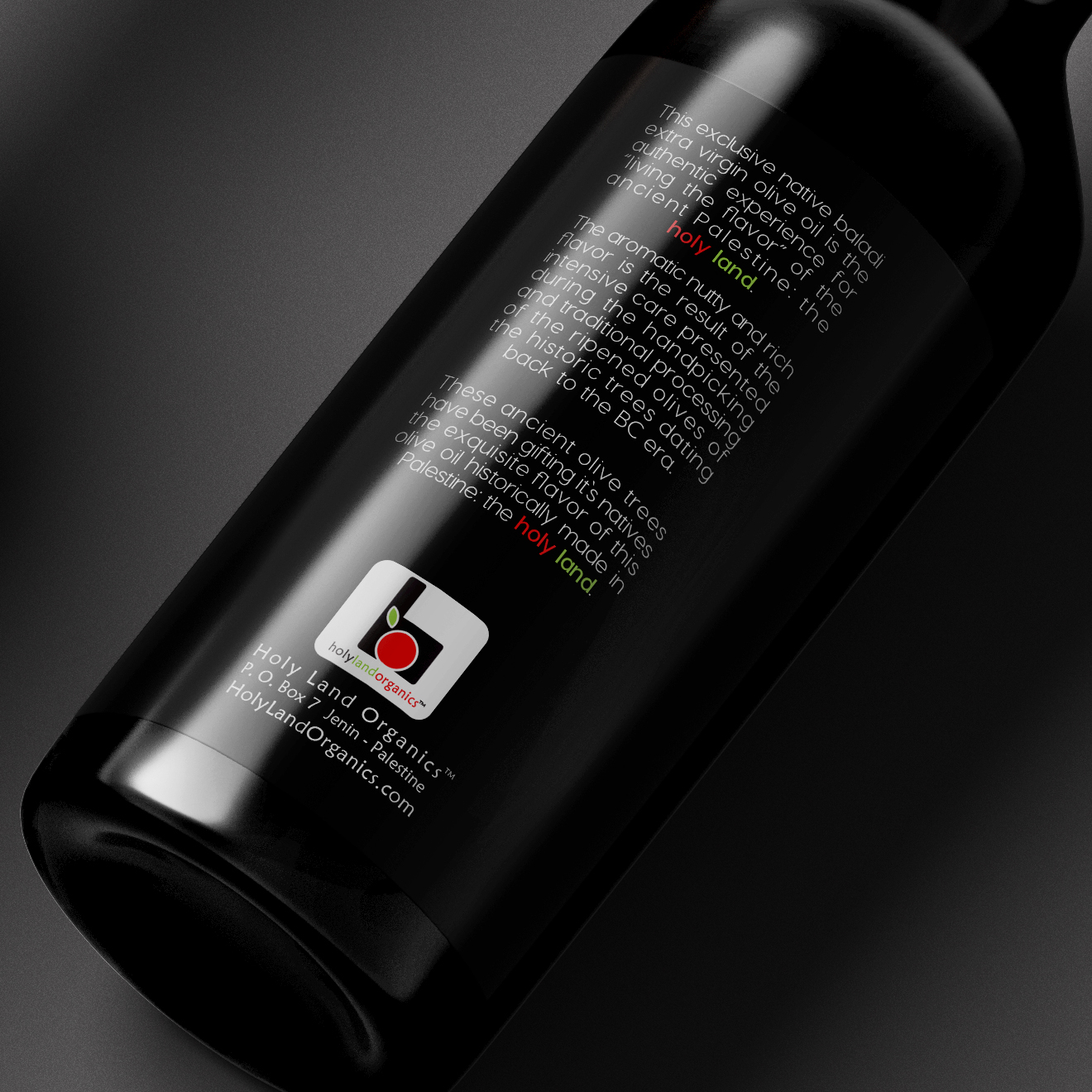-
Your shopping cart is empty!
Olive Oil

Extra Virgin Olive Oil of Palestine
Scientific Name: Olea Europaea L.
Common Name: Olive Oil.
Arabic Name: زيت الزيتون
Plant Family: Oleaceae.
It is undeniable that the Holy Land and its monuments are as ancient as the earth’s creations. Among the oldest evergreen Iconics landmarking Palestine is one admired ethnic and wildly grown holy tree, the olive tree. Palestine’s historic olive trees have allowed nations upon nations to bountifully enjoy its delights for thousands of years. They are considered a reflection of the Palestinians’ existence and the core of their culture, cuisine, and identity.
Our prehistoric olive trees have inhabited Palestine for thousands of years and considered to be holy by many around the world. The Palestinians, both Muslims and Christians, find olive trees as the most sacred presence that roots their existence and adherence to the Holy Land. For Muslims, the olive tree and its oil are praised throughout the Holy Quran numerous times. Similarly, in Christianity, the olive oil is reverenced so holy; it is associated with Christ himself.
The word messiah (Jesus Christ) stands for the “anointed king”. The king was anointed when his forehead was rubbed with olive oil. It is still used in many Christian healing ceremonies. It is irrefutable in both religions (Islam & Christianity) olive trees and their oil are sacredly acclaimed and embedded in their religious sectors.
Apart from the symbolic, spiritual, and sacred status of the olive tree and olive oil, numerous scientific facts are worth mentioning regarding this treasure of the Holy Land. Extensive bodies of knowledge have been generated by scientific researches regarding the health benefits of consuming and using olive oil on a regular basis.
Olive oil has distinct flavor and taste. Unlike many other oils, which are extracted from nuts and seeds, the olive is obtained from the olive berries and hence, carries large amounts of plant-derived anti-oxidants, phyto-sterols, and vitamins. Olive oil is recognized as one of the healthiest edible oils since it contains less saturated fats. Additionally, it composes linoleic (omega-6) and linolenic acid (omega-3) essential fatty acids at a recommended 8:1 ratio. The oil is high in calories. Its high-calorie content chiefly comes from its fats. However, it is especially rich in mono-unsaturated fatty acids (MUFA) like oleic acid and palmitoleic acid that help in lowering LDL or "bad cholesterol" and to increase HDL or "good cholesterol" in the blood. Research studies suggest that Mediterranean diet which is rich in monounsaturated fatty acids help to prevent coronary artery disease and strokes by favoring healthy blood lipid profile. Olive oil, especially extra virgin, contains tyrosol phenolic compounds such as oleuropein and oleocanthal. These compounds are responsible for its bitter and pungent taste. Oleocanthal, oleurpein, and its derivative hydroxytyrosol are nature’s most powerful anti-oxidants. Together with vitamin E and carotenoids, they play a vital role fighting against cancer, inflammation, coronary artery disease, degenerative nerve diseases, diabetes…etc.
Studies suggest that oleocanthal has ibuprofen (NSAID) like ant-inflammatory activities. Mediterranean diet that uses olive oil may be responsible in part for the low incidence of coronary artery disease. Being a vegetable source, it has very high levels of plant sterols, especially ß-sitosterol. The FDA has approved the following claim for phytosterols: "Foods containing at least 0.4 gram per serving of plant sterols, eaten twice a day with meals for a daily total intake of at least 0.8 gram, as part of a diet low in saturated fat and cholesterol, may reduce the risk of heart disease". Phyto-sterols competitively inhibit cholesterol absorption in the gut, and thereby can reduce total cholesterol levels by 10% to 15%.
Olive oil is rich in vitamin E. 100 g fresh extra-virgin oil contains 14.39 mcg (about 96% of RDA) of alpha-tocopherol. Vitamin E is a powerful lipid soluble antioxidant, required for maintaining the integrity of cell membrane of mucus membranes and skin through protecting it from harmful oxygen-free radicals. Additionally, extra-virgin oil is also a very good source of vitamin K; 100 g provides about 50% of DRI. Vitamin K has a potential role in the increase of bone mass by promoting osteotrophic activity in the bone. It also has established role in the treatment of Alzheimer's disease patients by limiting neuronal damage in the brain.
The nutty, buttery, fatty, pungent-peppery, stinging, sharp, and rich green-earthy tone is a simple attempt to describe the complex unique taste of our olive oil. The aroma of the Holy Land Organics™️ (baladi) olive oil is a critical part of its character. As described by several users, our olive oil has a complex scent of fresh-cut grass, cinnamon & tropical unripe fruits or sharp aromas of the ripe green olive fruit. The pungency is pleasantly noticeable in our freshly extracted olive oil. Pungency is a peppery sensation, detected in the throat, when swallowing the fresh Palestinian olive oil. Pungency and slight bitterness are positive characteristics of olive oil; it indicates the freshness and the completeness of its components. It becomes an appealing character once tasted, and true connoisseurs can no longer enjoy the extra filtered, bland oils found in many markets. The pungency is caused by a component known as oleocanthal.

Factors affecting the quality of our baladi olive oil
There are several factors affecting the quality of olive oil in general and our Palestinian olive oil in specific, some are controllable others are not.
The strain: there are hundreds of olive tree specimens with a wide range of uses and purposes. Our olive oil comes from the oldest strain known to man the “Baladi” also known as “Rumi”. The word “Rumi” in Arabic is the translation of Roman which indicated the era of when the trees were planted (the Roman Empire).
The Baladi strain has been planted in Palestine for thousands of years. The exact same trees that flourished as far back as man had domesticated olive trees are still alive and producing the same tasty olives today. We take pride in producing olive oil from trees that have been in existence for thousands of years. Various farmers experimented new “improved” imported strains and the results were disappointing. The historic baladi strain won the battle.
Location is the second factor affecting the quality of our olive oil. This factor affects the taste by impacting the acidity levels and other flavor components of the oil. The Baladi ancient olive trees were planted on the hills and foothills of the rocky rugged mountains of Palestine. Such locations provide well drained soil and well aired sunny spots presenting great growing conditions for the trees to thrive.
The climate is another factor affecting the quality of our olive oil. Olive trees grown in the Mediterranean climate are all considered to produce high quality oil. However, some locations are better than others even within the same region. Palestine is known as one of the best growing areas. For olive trees, the mild, short, rainy winter provides just enough water for the plants to set new branches and flower during late spring. The hot dry summer of Palestine provides the wild olive trees with prefect ripening temperatures that generate the extra spicy and aromatic flavor distinguishing the holy land`s olive oil over all others.
The harvesting method is another factor affecting the quality of our olive oil. Considering the location of the trees (rocky rugged mountains), handpicking is the only possible way for harvesting olives in Palestine. Handpicked means the quality is ensured on every single olive before sorted out for further processing. Machinery picking is not and cannot be used on the giant ancient trees.

The extracting technique is one of the most important factors for determining the quality of olive oil. The two common methods used for our oils are first cold press, and “continuous cold extraction”. Olives are loaded and rapidly spun inside a cylindrical, bladed hopper that chops the olives’ flesh while simultaneously centrifuging the oil and water away from the olives.
The last major factor affecting the quality of our oil is storing and packing. A well-known fact is that exposure to light, heat, and/or air is the worst enemy for olive oil. When light enters the container, it can cause the oil to photo-oxidize and taste rancid or bitter. Similarly, if olive oil is exposed to oxygen, more oxidation and a higher level of peroxides exist. Olive oil must be tightly stored in cool dark areas away from sunlight and open air. Our oil is stored for short periods of time in the dark packing facility before being packed in our specially designed bottles to protect against the damaging elements.
Our prehistoric olive trees have inhabited Palestine for thousands of years and considered to be holy by many around the world. The Palestinian people, both Muslims and Christians find olive trees as the most sacred presence that roots their existence and adherence to the Holy Land. The tree and oil of olives are extensively presented in the both the Holy Quran the Holy Bible.
Lowers Cholesterol
A collaborative study conducted by the Harvard School of Public Health and many other universities recommends including the extra virgin variety to reduce the risk of heart disease.
LDL cholesterol is the bad type of cholesterol, which increases the risk of heart attacks and other heart diseases. Extra virgin olive oil, which is rich in almost 40 antioxidant chemicals, helps reduce the oxidation effects of LDL cholesterol. It also helps increase HDL cholesterol levels.
Manages Diabetes
In a cohort study published in the journal Nutrition and Diabetes in 2017, it showed that olive oil can help in preventing and managing diabetes when included in the daily diet.
Weight Loss
Medical experts suggest that it is very difficult to gain weight from the mono-unsaturated fats present in olive oil. Research on the Mediterranean oil has shown positive results with regards to using it for weight loss as it contains healthy fats and is a great alternative for butter and other oils loaded with calories. Olive oil can increase the breakdown of food after a meal and help reduce food intake by making you feel fuller with smaller portions. When combined with other vegetables or legumes in dishes, olive oil can have positive effects on the digestive system which can directly impact weight regulation.
Prevents Inflammation
Olive oil is rich in polyphenols that have anti-inflammatory and antimicrobial properties. As a result, its use helps inhibit the growth of pathogenic bacteria and relieve inflammation.
Improves Digestion
Olive oil is known to aid in the digestive process. It is used as a medicinal oil to clean the digestive tract and improve bowel movements.
Delays Aging
Rich in antioxidants, olive oil slows the natural aging process of the human body. The monounsaturated fats found in olive oil help cells maintain their integrity. Used in cosmetic products and natural herbal therapy, it does wonders for the skin by giving it a natural shine.
Prevents Gallstones
Use of olive oil is also effective in preventing gallstones as it has a laxative effect. It is often used by people practicing gallbladder cleanse.
Strengthens Cell Walls
As per a 2018 study published in the Internation Journal of Molecular Sciences, olive oil contains polyphenols which help in building stronger cell walls. It also increases the elasticity of arterial walls, protecting you against various heart conditions.
Anticancer Potential
Olive oil is said to protect the human body against cancerous growth, especially bowel cancer, along with breast and skin cancer. Medical research done at Oxford University has shown positive signs that the acidic content of this oil can prevent the commencement of rectum and bowel cancer.
The Carcinogenesis journal has covered a study in 2018 suggesting that the extra virgin variety is a godsend when it comes to preventing cancer cell growth in the body.
Another study confirms the same effect and also reveals that out of all, olive oil has shown a helpful effect on breast cancer. Hydroxytyrosol, a major component of the oil may help prevent breast cancer in postmenopausal women.
Lowers Hypertension
A recent research study suggests that a Mediterranean diet comprising of food rich in unsaturated fats (found in olive oil and nuts), nitrite, and nitrate (found in leafy green vegetables) may help protect you from hypertension.
Other Benefits
The oil boosts the metabolism, the growth of good bone structure, and brain development in children. It is also an excellent source of vitamin E, which is very beneficial for older people. Studies have shown that an increased intake of vitamin E can lower the risk of developing cataracts and vision loss related to age.
Other than the sacred and/or scientific benefits of olive oil, one unassailable fact that is shared by all is the flavor. Olive oil is simply delicious. For basic consumers, a meal simply cannot be prepared without the use of olive oil one way or another. Olive oil is a very safe healthy item used by everybody from little children making a healthy snack dip to exquisite cuisines prepared by professional chefs. In Palestine, the olive oil jar is kept full on the dining table alongside the salt and pepper shakers at all times. In fact, some use it between meals as a snack by simply adding salt and dipping it with pita bread.